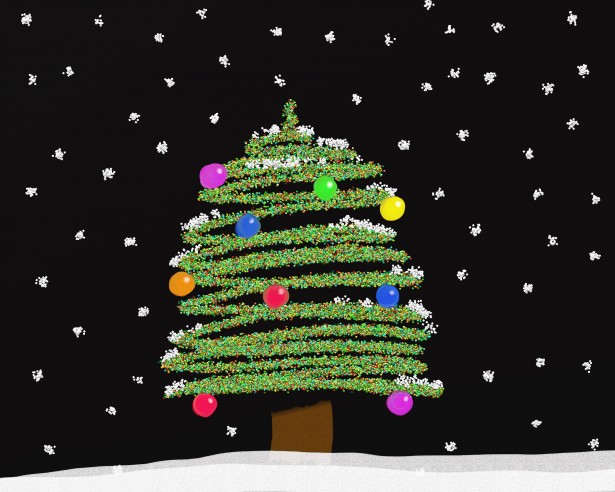How many ‘happys’ are there in Irish for the various seasonal greetings? Posted by róislín on Dec 14, 2017 in Irish Language
(le Róislín)
How many ways are there to say ‘happy’ in Irish? Quite a few, but for right now we’ll concentrate on two seasonal variations. One will be for saying ‘Happy Christmas,’ which in US English would be ‘Merry Christmas,’ and the other will be for ‘Happy New Year.’ The bottom line is that neither phrase typically uses a word related to ‘áthas,’ which is the word most beginners learn for ‘happiness.’ That’s as in saying ‘Tá áthas orm,’ (I am happy, lit. Happiness is on me.’). There is an adjective form related to this word, ‘áthasach‘ (happy), but it’s not typically used for seasonal greetings or for the everyday feeling; in my experience, it’s mostly used to describe stories, events, or situations, not how a person feels.
So what do we do instead? For ‘Happy’ or ‘Merry Christmas,’ the answer is fairly straightforward. We just use a different adjective for ‘happy,’ namely ‘sona.’ You may already know this one from phrases like ‘Lá breithe sona duit‘ (Happy birthday to you) or ‘Tá Seán sona sásta’ (Seán is happy (and) content, or ‘happy and satisfied / pleased / willing — there are many possible translations of ‘sásta‘ in this context).
But wait, as usual, there’s a little bit more to deal with. Irish rarely lets you off the hook with a word straight out of the dictionary-entry form. With words changing at the beginning (like ‘arán‘ and ‘an t-arán’), in the middle (like ‘fear‘ and ‘fir’), and at the end (like ‘oscail’ for the command ‘open’ and ‘oscailt‘ for the progressive form ‘ag oscailt,’ opening), it’s rare to find an Irish word that actually gets used without some change. What does this mean for the case of ‘Happy Christmas’?
Not too bad, all things considered. The ‘s’ of ‘sona‘ simply changes to ‘sh,’ as we see in ‘shona.’ The ‘s’ is no longer pronounced; the sound is basically like ‘HUN-uh.’ So the phrase is ‘Nollaig Shona!’ for ‘Happy Christmas’ or ‘Merry Christmas.’ Why ‘shona‘ for Christmas but ‘sona‘ for birthdays? Because ‘Nollaig‘ (Christmas) is feminine and ‘lá breithe‘ (birthday) is masculine.
For ‘Happy New Year,’ however, it’s a different kettle of fish altogether. One typical New Year’s greeting is ‘Athbhliain faoi shéan is faoi mhaise duit,’ used for ‘Happy New Year,’ but literally meaning ‘New Year under happiness and prosperity to you,’ or perhaps a little more flowingly, ‘A happy and prosperous New Year to you.’. So, no ‘happy,’ as such, at all. Instead we use phrases like ‘faoi shéan‘ (under happiness) or ‘faoi mhaise‘ (under prosperity). As far as I know, there’s no special significance to the use of ‘faoi‘ (under) here — it simply means that the ‘séan‘ (happiness) is connected to the word that comes before the prepositional phrase, that is, ‘athbhliain.‘ The word ‘athbhliain‘ is an interesting structure in and of itself, with ‘ath-‘, as a prefix usually meaning ‘re-‘, as in ‘athdhéanamh‘ (to redo) or ‘athléamh‘ (reread).
So, sin iad: Nollaig Shona for Christmas and Athbhliain faoi shéan is faoi mhaise duit. If you’re getting your Christmas or Season’s Greetings cards ready, I hope you found this helpful. To answer the basic question in the title of this post (How many ‘happys’ …?), the answer for now is two for seasonal usage (faoi shéan, sona), and then there’s “áthasach,” but there are others that are used in different contexts, like “séanmhar” and “gliondrach.” For more on “happy” and “happiness,” you might want to check out the December 3, 2011 blogpost on a similar topic (nasc thíos). SGF — Róislín
nasc d’iarbhlagmhír ar an ‘abhar seo: ‘Sona’ or ‘Shona’ for ‘Happy Christmas’ (Merry Christmas) in Irish? Posted by róislín on Dec 1, 2014 in Irish Language, https://blogs.transparent.com/irish/sona-or-shona-for-happy-christmas-merry-christmas-in-irish/
nasc d’iarbhlagmhír ar na focail ‘happy’ agus ‘happiness’ i gcomhthéacsanna difriúla: Happiness Is … Lots of Ways to Say “Happy” in Irish (including “Happy Christmas”)Posted by róislín on Dec 3, 2011 in Irish Language

Build vocabulary, practice pronunciation, and more with Transparent Language Online. Available anytime, anywhere, on any device.





Leave a comment: